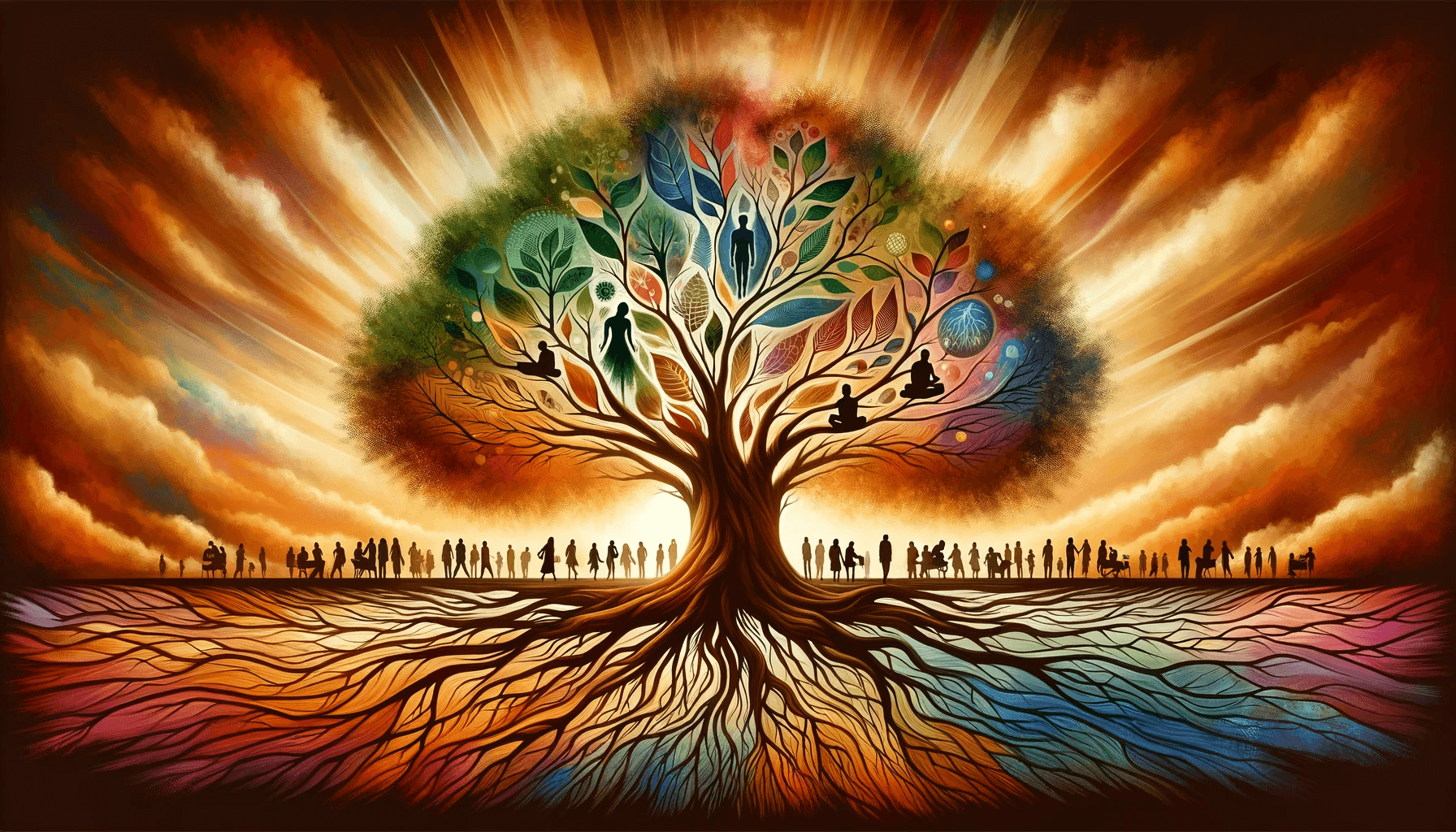Sponsored By Awaken Your Great Self
Table of Contents
Introduction to Taoism and its Principles
Taoism, also known as Daoism, is an ancient Chinese philosophy emphasizing living in harmony with the Tao, which can be understood as the natural way of the universe. It originated in the 4th century BCE and has since influenced various aspects of Chinese culture, including art, literature, medicine, and martial arts. At the core of Taoism lies finding balance and harmony in all aspects of life.
Understanding the concept of ‘Be Like Water.’
One of the fundamental principles of Taoism is the concept of ‘Be Like Water.’ This phrase, popularized by the legendary martial artist Bruce Lee, encapsulates the idea of adapting to life’s ever-changing circumstances, just as water takes the shape of its container. Water is fluid, flexible, and resilient, which Taoists strive to embody daily.
To ‘Be Like Water’ means to let go of rigid expectations and control and, instead, flow with the natural currents of life. It encourages individuals to embrace change, remain adaptable, and find harmony amid chaos. By embodying the fluidity of water, one can navigate through life’s challenges with grace and ease.
The philosophy of balance in Taoism
Balance is a central theme in Taoism. The philosophy emphasizes the importance of maintaining equilibrium between opposing forces, such as yin and yang, light and dark, and action and inaction. Taoists believe that by finding balance, one can achieve harmony and inner peace.
The concept of balance in Taoism can be seen in nature. Just as day turns into night and the seasons change, life is a constant cycle of ups and downs. Taoism teaches that we can find balance and harmony by accepting and embracing these cycles. Like water flowing down a river, we can learn to navigate the twists and turns of life with grace and adaptability.
Applying the principle of ‘Be Like Water’ in daily life
In our fast-paced and unpredictable world, the ‘Be Like Water’ principle can serve as a guiding light. By embracing water’s fluidity and adaptability, we can easily navigate life’s challenges. Here are some practical ways to apply this principle in daily life:
- Let go of attachments: As water effortlessly flows over obstacles, we can learn to relinquish attachments and expectations. We can find peace and contentment by releasing our grip on control and allowing things to unfold naturally.
- Embrace change: Change is a constant in life. Instead of resisting it, embrace change with an open mind and heart. Like water, adapt to new circumstances and find the opportunities that arise from change.
- Cultivate resilience: Water is resilient and can withstand immense pressure. Similarly, develop strength in the face of adversity. Bounce back from setbacks and learn from challenges, knowing they are part of the journey.
Taoist practices and exercises for finding balance and harmony
Taoism offers various practices and exercises to help individuals cultivate balance and harmony. These practices often involve meditation, breathwork, and movement. Here are a few examples:
- Tai Chi: Tai Chi is a gentle martial art that combines flowing movements with deep breathing and mental focus. Practicing Tai Chi helps cultivate balance, flexibility, and inner calm.
- Qi Gong: Qi Gong is a practice that involves slow, deliberate movements, breathwork, and visualization. It aims to cultivate and balance the body’s vital energy, qi. Regular Qi Gong practice can enhance overall well-being and promote harmony.
- Meditation: Meditation is a cornerstone of Taoist practice. Individuals can cultivate inner peace and clarity by quieting the mind and focusing on the present moment. There are various forms of meditation within Taoism, including mindfulness meditation, breath awareness, and Taoist visualization practices.
Famous Taoist quotes and teachings on ‘Be Like Water.’
Throughout history, many Taoist masters and philosophers have shared their wisdom on ‘Be Like Water.’ Here are a few famous quotes:
- “The highest good is like water. Water gives life to the ten thousand things and does not strive. It flows in places men reject and so is like the Tao.” – Lao Tzu.
- “Be like water making its way through cracks. Do not be assertive, but adjust to the object, and you shall find a way around or through it. If nothing within you stays rigid, outward things will disclose themselves.” – Bruce Lee.
- “In the world there is nothing more submissive and weak than water. Yet, for attacking that which is hard and strong, nothing can surpass it.” – Lao Tzu.
These quotes remind us of the power and wisdom of embracing water’s fluidity and adaptability.
The role of ‘Be Like Water’ in martial arts and sports
The philosophy of ‘Be Like Water’ has significantly impacted martial arts and sports. Bruce Lee, a renowned martial artist and actor, popularized and applied this concept to his own martial arts practice. By embodying the fluidity and adaptability of water, Bruce Lee revolutionized martial arts and inspired generations of practitioners.
In sports, athletes often draw inspiration from the Taoist philosophy of ‘Be Like Water.’ By remaining flexible, adaptable, and in flow, athletes can enhance their performance and overcome obstacles. Just as water adjusts to its surroundings effortlessly, athletes can adapt their strategies and techniques to succeed.
Taoist symbols and representations of ‘Be Like Water.’
Taoism is rich in symbolism, and various symbols represent the principle of ‘Be Like Water.’ One of the most well-known symbols is the yin-yang symbol, the balance between opposing forces. It exemplifies the harmonious interplay between yin (passive, feminine) and yang (active, masculine) energies.
Water itself is also a powerful symbol in Taoism. It represents the fluidity, adaptability, and resilience that Taoists strive to embody. Just as water takes the shape of its container, Taoists aim to adapt to their surroundings and flow with the currents of life.
Taoist masters and their teachings on finding balance and harmony
Throughout history, numerous Taoist masters have shared their teachings on finding balance and harmony. Lao Tzu, the legendary philosopher and founder of Taoism, emphasized the importance of aligning oneself with the natural flow of the universe. His teachings in the Tao Te Ching have served as a guide for seekers of wisdom and harmony.
Other notable Taoist masters include Chuang Tzu, Lieh Tzu, and Zhang Sanfeng. Each master contributed to the understanding and practice of Taoism, offering unique insights on finding balance and harmony in life.
Conclusion: Embracing the Taoist philosophy of ‘Be Like Water.’
In a world filled with constant change and challenges, embracing the Taoist philosophy of ‘Be Like Water’ can bring balance and harmony to our lives. By embodying water’s fluidity, adaptability, and resilience, we can navigate through life’s ups and downs with grace and ease.
We can cultivate balance and inner peace through practices such as Tai Chi, Qi Gong, and meditation. We can find contentment in the present moment by letting go of attachments and embracing change. And by drawing inspiration from the wisdom of Taoist masters and the symbolism of water, we can align ourselves with the natural flow of the universe.
So, let us embrace the ‘Be Like Water’ philosophy and find balance and harmony in life’s journey. As Lao Tzu once said, “The journey of a thousand miles begins with a single step.” Take that step, and let the wisdom of Taoism guide you in finding balance and harmony.





One response to “Finding Balance and Harmony: Exploring the Taoist Philosophy of ‘Be Like Water’”
[…] Related: Exploring the Taoist Philosophy of ‘Be Like Water’ […]